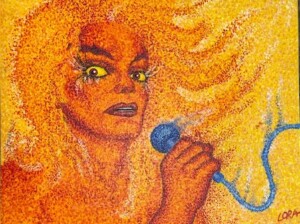
Who, ME, autistic? But I was ultimately diagnosed with ASD, a neurotype you’re born with.
Me, autistic? NO. I don’t move stiffly. I feel love for family members. I function as high as anyone can function.
While I was growing up nobody ever suggested it. I acted completely different from fictitious depictions of autism in TV shows and movies.
As a child I didn’t have strange preoccupations like staring in a trance at things that went up and down such as kids on a trampoline — like the little autistic boy in a movie who was fascinated by anything that went up and down.
Nope. I only loved to look at window shades when the car I was riding in went down residential streets. “Look at that big shade!”
Weird interests in childhood? Not ME! It was perfectly normal for a little girl to be intrigued by different size window shades and wanting every window in her house to have a shade so she could delight in pulling it and watching it flap back up.
Only those autistic kids in TV shows did weird stuff, while I was fascinated by the shape of car trunks and wished I could be in a coma to know what it felt like.
Several years later I wanted to be attacked by a shark to show off the scars. I knew the scientific names of many shark species. I drew sharks. I loved to talk about them.
Quite a few teachers in the ninth and tenth grade didn’t like me, even though I sat still in class, didn’t chew gum, didn’t talk out of line, didn’t pass notes, didn’t cut class, turned in my homework and got very good grades. But something about me rubbed them the wrong way. Hmmm…
From time to time I’d read stories about autistic people, like the man who rode his bike every day down the same busy street up to a certain point.
Then next day he’d go just past that point. He did this day after day, gradually tacking on distance until the bike rides took three hours one way.
Then there was the man who was obsessed with adding onto 1, on his calculator, one increment at a time: 1 + 1, 2 + 1, 3 + 1, and was up to over 3,000, excitedly explaining this on a radio talk show. I thought, “That guy’s autistic.”
Then there was famed autist and livestock animal behavior expert Temple Grandin. Somewhere along the way I got the impression that she wasn’t able to love another human being. I loved my parents and wanted to find a man to fall in love with; I couldn’t be autistic.
It STILL never dawned on me that I could be autistic, despite a lifelong feeling of being detached from people, of not operating on the same wavelength as everyone else, of finding so many social customs vexing or just plain dumb.
I’d even refer to my demeanor as frequently being “Vulcan.”
I’d hear about “high-functioning autism” and still, the lightbulb didn’t go on.
By the time I was well into adulthood, it STILL hadn’t occurred to me that all of my peculiar and odd internal and sensory experiences could be due to autism.
For instance, I hated clothing tags — I had to immediately snip them out, right down to the nub, even if they were located where they could never touch my skin.
I even took out tags on towels and inside wallets and fanny packs. Just knowing that somewhere on these items was this tag … really bothered me. It had to come out.
And my intense interests in weird things or going overboard with my interests in more popular topics?
That was just my artistic mind, not autistic! I also explained it away by my high intelligence and curious nature.
I never liked watching boxing matches. Then one day I became fascinated by the seizures a boxer has after a knockout. I’ve watched every single YouTube of this, intently studying every body part during the seizure.
I read all I could find about “posturing” after being struck in the head. I sought out videos of this from skateboarding accidents, car accidents and football collisions.
But I never became interested in boxing as a sport. I also never developed an interest in viewing seizures from other causes such as brain tumors, epilepsy or adverse reactions to drugs. It was only from getting struck in the head.
This is an example of a circumscribed interest. I chalked it up to my lifelong interest in the human body and medicine! Many of my other keen interests have been circumscribed.
Missing Social Cues

At some point around 2017 I began wondering if I might have Asperger’s syndrome, not knowing that in the U.S. this term had been removed from the DSM-5 (the diagnostic manual for mental health experts) in 2013 and replaced with Level 1 Autism Spectrum Disorder.
But I’d then always think, “No, I can’t be an Aspie; I can read social cues.”
I’d read how autistic people don’t detect subtle social cues. I’d think, “I can. I can read people. They can’t read ME!”
They can’t read me. They can’t read me.
If someone’s always felt that the so-called normal people have difficulty reading him or her — isn’t that a sign that they might have autism?
“I have no trouble reading social cues. I just can’t tell sometimes if someone likes me or is just acting gracious as a social obligation.
“Does my sister-in-law really like me, or does she just go into automatic hostess mode with me because she’s an experienced socialite?”
Would a neurotypical woman have these reflections?
So why have I had social difficulties all my life? Could it be because — at least in part — I’ve been missing social cues all along?
How am I supposed to know I’ve been correctly reading social cues? Did I get a chocolate treat every time I nailed one?
How could I possibly know I got a social cue wrong? Did a buzzer go off?
Curious, I took a few online tests for autism. The results weren’t off the charts, but they were clearly out of neurotypical range: in the borderline area.
A few years later I began reading articles written by autistic people.
This was a game changer!
Holy Mother of God, I could’ve written much of their narrative!
“That’s ME!” I’d think. “That’s how I feel!” The traits about neurotypicals that perplexed them also perplexed me!
I became fast-hooked on reading all of these subjective experiences of autistic women and men.
Every time I read an article written by a person on the Spectrum, it resonated. Not some of them. ALL OF THEM.
I learned more and more about autism. I then realized, “My God … the signs were smack under everyone’s nose during my childhood!”
This lead me to begin a diagnostic journey. It can take months between intake form and actual evaluation.
The wait is anxiety-ridden, even agonizing, because many people won’t help but fear that they’ll be denied the diagnosis – the one diagnosis that could explain everything about them – finally – a diagnosis that will connect all those dots and make everything make sense.
A denial of the diagnosis would be a crushing blow, a pile-drive into a deep dark void from which there’s no escape.
But my take is this: If you really, really feel in your gut that you’re on the Autism Spectrum, then chances are very much in your favor that you ARE.
If your examiner says you can’t have autism because of any of the following – making good eye contact, having neurotypical friends, ability to give speeches to groups of people, smiling a lot or having good executive function – you’ll be extremely wise to seek out a new evaluation by a different diagnostics center.
Top image: ©Lorra Garrick
 Lorra Garrick has been covering medical and fitness topics for many years, having written thousands of articles for print magazines and websites, including as a ghostwriter. She’s also a former ACE-certified personal trainer. In 2022 she received a diagnosis of Level 1 Autism Spectrum Disorder.
Lorra Garrick has been covering medical and fitness topics for many years, having written thousands of articles for print magazines and websites, including as a ghostwriter. She’s also a former ACE-certified personal trainer. In 2022 she received a diagnosis of Level 1 Autism Spectrum Disorder.
.
Do Autistic People Feel Different Among Other Autistic People?


























